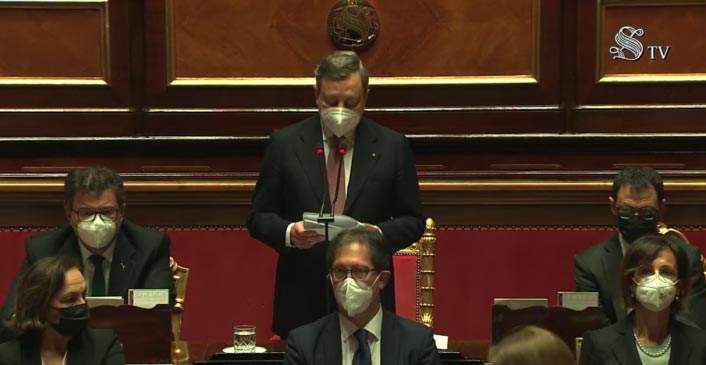Prime Minister Mario Draghi made his first speech today, reporting in the Senate on the policy statements of the government he heads. Draghi’s speech first focused on the damage caused by the Covid-19 pandemic, which to date has caused 92,522 victims in Italy, a decrease in life expectancy of 4-5 years in the most affected areas and 1-2 years nationwide (a decline not seen since the world wars), and serious consequences on the economic and social fabric: the increase in poverty, the decrease in employment (-444.000 compared to 2019), the effects on income distribution inequality, which increased by four percentage points compared to 2019, and economic recession. There are two priorities according to Draghi to get going again: the vaccination plan and schools.
“I have often wondered whether we, and I refer first of all to my generation, have done and are doing for them all that our grandparents and fathers did for us, sacrificing beyond measure,” Draghi said. “It is a question we have to ask ourselves when we do not do everything necessary to best promote human capital, training, schools, universities and culture. A question to which we must give concrete and urgent answers when we disappoint our young people by forcing them to emigrate from a country that too often does not know how to value merit and has not yet achieved effective gender equality. A question we cannot evade when we increase our public debt without having spent and invested to the best of our ability resources that are always scarce. Every waste today is a wrong we do to the next generation, a taking away of their rights. I express before you, who are the elected representatives of the Italians, the hope that the desire and need to build a better future will wisely guide our decisions. In the hope that the young Italians who will take our place, including here in this hall, will thank us for our work and not have anything to reproach us for our selfishness.”
“We are a great economic and cultural power,” the premier stressed. “I have always been astonished and somewhat pained over the years to notice how often others’ judgment of our country is better than ours. We need to be prouder, fairer and more generous towards our country. And recognize the many firsts, the deep richness of our social capital, of our volunteerism, that others envy us.”
As for the priority on schools, Draghi says that “the spread of Covid has caused deep wounds in our communities, not only on the health and economic level, but also on the cultural and educational level. Girls and boys have had, especially those in secondary schools, school service through Distance Learning, which, while ensuring continuity of service, cannot help but create hardships and highlight inequalities. One figure best clarifies the current dynamic: compared with 1,696,300 students in secondary schools, in the first week of February only 1,039,372 students (61.2 percent of the total) had service through Distance Learning assured. The school: not only must we quickly return to a normal school schedule, even distributing it over several time slots, but we must do everything possible, in the most suitable ways, to make up for the hours of face-to-face teaching lost last year, especially in the regions of the South where Distance Learning encountered more difficulties. There is a need to revise the design of the annual school calendar. Align the school calendar with the needs arising from the lived experience since the beginning of the pandemic. The return to school must take place safely. It is necessary to invest in a cultural transition from the internationally recognized humanistic identity heritage. We are called upon to design an educational pathway that combines the necessary adherence to the required quality standards, including in the European landscape, with grafts of new subjects and methodologies, and combine scientific skills with those of humanistic areas and multilingualism. Finally, it is necessary to invest in the training of teaching staff in order to align the educational supply with the demand of the new generations.”
Mario Draghi made no reference to the culture sector, but in one passage he mentioned tourism, which will be able to enjoy a dedicated ministry. “Even in our country,” the prime minister said, “some models of growth will have to change. For example, the model of tourism, an activity that before the pandemic accounted for 14 percent of our total economic activity. Businesses and workers in that sector must be helped to recover from the disaster created by the pandemic. But without forgetting that our tourism will have a future if we do not forget that it lives on our ability to preserve, that is, at least not squander, cities of art, places and traditions that successive generations through many centuries have been able to preserve and have handed down to us.”
 |
| Mario Draghi's first speech. We are a great economic and cultural power |
Warning: the translation into English of the original Italian article was created using automatic tools. We undertake to review all articles, but we do not guarantee the total absence of inaccuracies in the translation due to the program. You can find the original by clicking on the ITA button. If you find any mistake,please contact us.